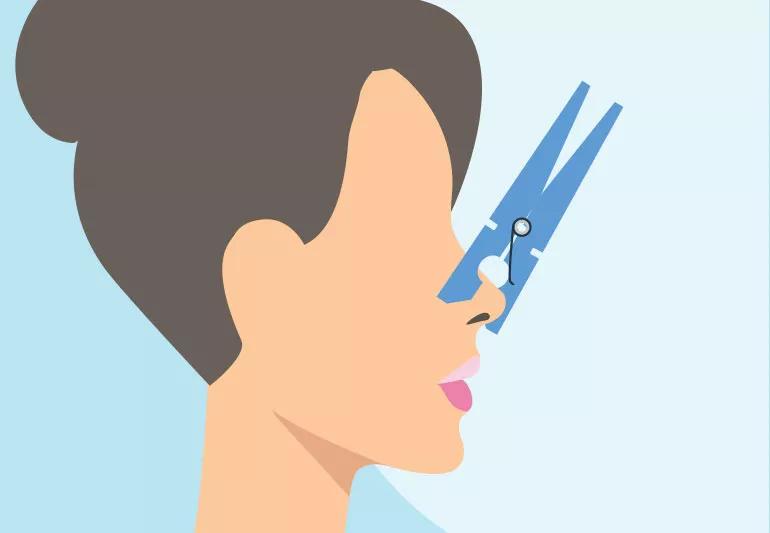From causes to diagnosis + when you need treatment

Whether it’s the smell of cookies baking or Fido’s … ahem … gas, smells have a way of seizing our attention. But when subtle odors interfere with daily living, you may have a condition called hyperosmia.
Advertisement
Cleveland Clinic is a non-profit academic medical center. Advertising on our site helps support our mission. We do not endorse non-Cleveland Clinic products or services. Policy
“Hyperosmia is a heightened or increased sense of smell,” explains ENT (ear, nose and throat) specialist and rhinologist Raj Sindwani, MD. People can experience it all the time or occasionally. And while hyperosmia doesn’t always require treatment, it can signal an underlying health issue that does. Dr. Sindwani shares what you need to know about this unique and uncommon smell disorder.
Hyperosmia is relatively rare, and doctors usually don’t know why someone develops it. But there’s a seemingly endless list of things that may be to blame, including:
“Other factors can also disturb our sense of smell, including exposure to toxins, such as lead or mercury. Allergies, polyps and tumors can also affect smell. So can things like diabetes and nutritional deficiencies. It’s all over the map when it comes to smell disturbances,” notes Dr. Sindwani.
While smell disorders don’t run in families, an underlying cause might. “We don’t know what causes smell disorders — so there’s no real genetic link that we’re aware of. For example, cystic fibrosis can run in families and affect smell. But smell disorders on their own generally do not.”
Advertisement
It’s complicated. Because so many things may cause hyperosmia, symptoms can include anything and everything. But Dr. Sindwani recommends seeing a doctor if:
“A doctor can rule out a treatable causes for your sensitivity to smell by reviewing your health history and doing a physical exam,” says Dr. Sindwani. “A nasal endoscopy is the gold standard test to rule out anything physical going on in your nose like a mass, polyps or infection.”
During this minor procedure (which is performed with you awake and sitting in an exam chair – don’t worry it doesn’t hurt!), your doctor:
“With this type of endoscopy, we can actually see the area where the smell receptors live high up in the nasal cavity,” explains Dr. Sindwani.
If your nose gets the “all clear,” your doctor may do a “scratch and sniff” smell test. If that points to an increased sense of smell, hyperosmia is usually the diagnosis.
Smell and taste are also closely linked. (Ever smell something so strong you could taste it?) For that reason, a smell disorder can initially seem like a taste problem. “Often, people come in and say, ‘Things don’t taste right to me,’ when over time, we learn it’s a smell problem. You can have one, the other or both of those things in play.”
If you suspect you have hyperosmia or another smelling issue, Dr. Sindwani says a good first step is to see an ENT specialist. The specialist can rule out any physical causes for smell problems, such as tumors, polyps or infection. Sometimes imaging tests (like a CT or MRI scan) can also be helpful in looking for underlying issues.
“Beyond that, hyperosmia should be managed depending on what the underlying issue is. Migraines might be treated by your internist or neurologist, for example. If you have a brain issue, such as epilepsy, multiple sclerosis, Alzheimer’s disease or Parkinson’s disease, that might be treated by a neurologist or other type of doctor as well.”
But determining a treatment plan can be challenging since causes are hard to pinpoint. In those cases,doctors can recommend supportive treatment measures, such as:
Advertisement
Advertisement
Learn more about our editorial process.
Advertisement

If your nose is constantly running, it could be allergies, chronic sinusitis, nasal polyps or other concerns

Allergies, indigestion and the effects of gravity can all mess with your nose at night

These growths inside the nose don’t cause cancer, but it’s important to make sure you get a proper diagnosis

Avoid irritants and allergens, run a humidifier, try saline rinses and ask a healthcare provider about medications

Staying calm, sitting up straight and gently pinching the sides of your nostrils can help a bloody nose go away faster

Dry air, allergies or nose-picking may be to blame for nighttime epistaxis

Take care of your runny or stuffy nose by staying hydrated, using a humidifier and considering a medication

Allergies, acid reflux and even pregnancy can increase drainage and upset your stomach

Start having sex about 72 hours before ovulation, then at least every other day during your fertile window

Attachment theory suggests that your earliest relationships shape connections throughout your life

It isn’t a recognized mental health disorder, but research shows that problematic social media use can negatively affect your mental health, self-esteem and sleep